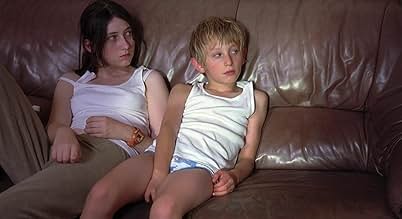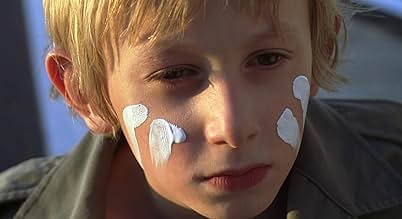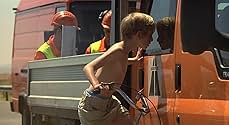IMDb-BEWERTUNG
6,9/10
5140
IHRE BEWERTUNG
Das Leben einer isolierten Familie auf dem Land wird auf den Kopf gestellt, als eine Hauptverkehrsstraße neben ihrem Grundstück, die 10 Jahre zuvor gebaut, aber anscheinend aufgegeben worden... Alles lesenDas Leben einer isolierten Familie auf dem Land wird auf den Kopf gestellt, als eine Hauptverkehrsstraße neben ihrem Grundstück, die 10 Jahre zuvor gebaut, aber anscheinend aufgegeben worden war, endlich eröffnet wird.Das Leben einer isolierten Familie auf dem Land wird auf den Kopf gestellt, als eine Hauptverkehrsstraße neben ihrem Grundstück, die 10 Jahre zuvor gebaut, aber anscheinend aufgegeben worden war, endlich eröffnet wird.
- Auszeichnungen
- 10 Gewinne & 5 Nominierungen insgesamt
Ivaylo Ivanov
- L'éboueur
- (as Ivailo Ivanov)
Marc Berman
- Radiotauroute
- (Synchronisation)
Empfohlene Bewertungen
Home, the directorial debut from young French-Swiss hopeful Ursula Meier, is a film about communal captivity, the disenfranchisement of an archetypal family unit and, in many ways, it's the 'road movie' of directionless modernity.
This César nominated drama follows a dysfunctional family who live beside an abandoned motorway, somewhere in-between two French cities. Although the house is an uninspired concrete block, their surrounding landscape is rather bucolic in stature, with the kids using the roadway as a garden to sunbathe, take a dip in the blow-up pool, or play street hockey across it's straight, uninspired grey surface. Although we never get the conclusive hows and whys of their unconventional living situation, it's implied that it was a decision of desperation on behalf of the agoraphobic, stay-at-home mother Marthe (the enchanting Isabelle Huppert). When her doting husband Michel (Olivier Gourmet) returns home from work one evening to break the news that the road project is going to reconvene, he is in distress and determined that the family should leave immediately. Marthe is less intimidated, resolute on staying in the unlikely place she has made into an idyllic family home. With cars soon filling the motorway day and night, the risk of pollution causes friction to emanate from within the family, and soon their paradise retreat turns into a tarmacked prison.
Devised by a four piece writing team, including Meier and fellow upcoming European auteur Olivier Lorelle (Days of Glory), it's perhaps no wonder how every character in the family is fleshed out. All play an integral role in the group dynamic, how it will soon be tested and, to an extent, shattered. The suffocating mother Marthe who is afraid she'll lose her family to the outside world, the stoic rock father Michel, the typically angsty eldest daughter, the indifferent and paranoid middle child Marion (Madeleine Budd), and, most sympathetically, the young, curious and adventure seeking son Julien (Kacey Mottet Klein). The cast are all pulling their weight here, particularly Haneke's muse Huppert, in an atypically austere maternal role, matched with Dardenne Brothers' regular Olivier Gourmet as a compassionate father reaching the end of his tether.
As the family's proximate relationship intensifies, the eco-parable is verified, and the drone of cars whizzing past their kitchen window becomes unbearable, Meier resorts to feverish melodrama, with a life-threatening consequence. Cinematographer Agnès Godard manages to make the transition from warm open landscape to claustrophobic crazy pretty aimlessly, but the drastic shift in narrative tone removes any sympathy we once had for the barmy quintet, replacing it with utmost frustration. Why can't they leave? What's so special about the house? Not only implausible, the stir-crazy psychological torment in Home's witching hour ends up compromising what would otherwise be an astoundingly accomplished feature debut.
http://www.366movies.com
This César nominated drama follows a dysfunctional family who live beside an abandoned motorway, somewhere in-between two French cities. Although the house is an uninspired concrete block, their surrounding landscape is rather bucolic in stature, with the kids using the roadway as a garden to sunbathe, take a dip in the blow-up pool, or play street hockey across it's straight, uninspired grey surface. Although we never get the conclusive hows and whys of their unconventional living situation, it's implied that it was a decision of desperation on behalf of the agoraphobic, stay-at-home mother Marthe (the enchanting Isabelle Huppert). When her doting husband Michel (Olivier Gourmet) returns home from work one evening to break the news that the road project is going to reconvene, he is in distress and determined that the family should leave immediately. Marthe is less intimidated, resolute on staying in the unlikely place she has made into an idyllic family home. With cars soon filling the motorway day and night, the risk of pollution causes friction to emanate from within the family, and soon their paradise retreat turns into a tarmacked prison.
Devised by a four piece writing team, including Meier and fellow upcoming European auteur Olivier Lorelle (Days of Glory), it's perhaps no wonder how every character in the family is fleshed out. All play an integral role in the group dynamic, how it will soon be tested and, to an extent, shattered. The suffocating mother Marthe who is afraid she'll lose her family to the outside world, the stoic rock father Michel, the typically angsty eldest daughter, the indifferent and paranoid middle child Marion (Madeleine Budd), and, most sympathetically, the young, curious and adventure seeking son Julien (Kacey Mottet Klein). The cast are all pulling their weight here, particularly Haneke's muse Huppert, in an atypically austere maternal role, matched with Dardenne Brothers' regular Olivier Gourmet as a compassionate father reaching the end of his tether.
As the family's proximate relationship intensifies, the eco-parable is verified, and the drone of cars whizzing past their kitchen window becomes unbearable, Meier resorts to feverish melodrama, with a life-threatening consequence. Cinematographer Agnès Godard manages to make the transition from warm open landscape to claustrophobic crazy pretty aimlessly, but the drastic shift in narrative tone removes any sympathy we once had for the barmy quintet, replacing it with utmost frustration. Why can't they leave? What's so special about the house? Not only implausible, the stir-crazy psychological torment in Home's witching hour ends up compromising what would otherwise be an astoundingly accomplished feature debut.
http://www.366movies.com
Isabelle Huppert is a French mother of three, whose husband goes off to work in a big green diesel Mercedes estate. Their youngest is a boy, about 8. Then a girl, about 14, who's studious and questioning. Eldest is a late-teen daughter who wears as little as possible, chain-smokes and sunbathes in a bikini on a lounger in the garden, with heavy metal pounding from a ghetto-blaster.
This scenario and scene is featured and remains with us most of the time, in one form or another. Oh, except that their rather run-down shabby house sits right bang next to a motorway, that carries no traffic, except as the biggest car park imaginable for the family, who also use it as an extension to their property. They need to cross this bitumen desert to reach civilisation; work, shops and school for the kids.
One day, the boy sees trucks on the carriageway, whilst out on his bike. Soon after telling his father, who doesn't believe him, the motorway is resurfaced overnight. Radio reports say that it's the missing link in the national network and there's huge interest from the motoring public. The two youngest anticipate some new projects coming on.
What happens next is bizarre, believable and really rather frightening. And comical. By trying to live their (rather odd) lives exactly as before - crossing the road for school, shopping, bikini-sunbathing - all a few feet away from juggernauts and during a heatwave.
The way that the stakes against them get higher and naturally seem more bizarre, the more they try and carry on regardless, perhaps in the same way as if you tried to re-route an ant trail. Toward the end, you will start wondering where on earth all this can possibly lead to - I'm not going to spoil it for you!
I did think of one of Michael Haneke's early films when watching 'Home' that had this sort of 'in reverse' psychology, but which was decidedly cold, un-humorous - about a perfectly ordinary middle-class Austrian family, who coped - and then didn't.
You can, of course, take Swiss director Ursula Meier's fable as a comedy, or an environmental statement or a family drama, or all three. Being very different, it grabs the attention, without ever being ridiculous and somehow manages to sustain this element and story all the way through. It's also decidedly 'Continental', the bathing habits of the eldest daughter, naked and smoking in the bath listening to her Walkman, with the rest of the family chatting away next to her, mostly clothed. This - and other forms of a natural lack of inhibition seems healthy and refreshing, especially compared to our British straight- laced ways.
I give 9/10 as it's an ambitious film in both its audacity and originality and the fact that it gets away with it, becoming a sort of psychological horror. . .For a film to be so memorable is rare these days, although the title, unfortunately is. All the players, especially Huppert (naturally) are uniformly excellent and totally believable, as is their environment, which IS worrying....
This scenario and scene is featured and remains with us most of the time, in one form or another. Oh, except that their rather run-down shabby house sits right bang next to a motorway, that carries no traffic, except as the biggest car park imaginable for the family, who also use it as an extension to their property. They need to cross this bitumen desert to reach civilisation; work, shops and school for the kids.
One day, the boy sees trucks on the carriageway, whilst out on his bike. Soon after telling his father, who doesn't believe him, the motorway is resurfaced overnight. Radio reports say that it's the missing link in the national network and there's huge interest from the motoring public. The two youngest anticipate some new projects coming on.
What happens next is bizarre, believable and really rather frightening. And comical. By trying to live their (rather odd) lives exactly as before - crossing the road for school, shopping, bikini-sunbathing - all a few feet away from juggernauts and during a heatwave.
The way that the stakes against them get higher and naturally seem more bizarre, the more they try and carry on regardless, perhaps in the same way as if you tried to re-route an ant trail. Toward the end, you will start wondering where on earth all this can possibly lead to - I'm not going to spoil it for you!
I did think of one of Michael Haneke's early films when watching 'Home' that had this sort of 'in reverse' psychology, but which was decidedly cold, un-humorous - about a perfectly ordinary middle-class Austrian family, who coped - and then didn't.
You can, of course, take Swiss director Ursula Meier's fable as a comedy, or an environmental statement or a family drama, or all three. Being very different, it grabs the attention, without ever being ridiculous and somehow manages to sustain this element and story all the way through. It's also decidedly 'Continental', the bathing habits of the eldest daughter, naked and smoking in the bath listening to her Walkman, with the rest of the family chatting away next to her, mostly clothed. This - and other forms of a natural lack of inhibition seems healthy and refreshing, especially compared to our British straight- laced ways.
I give 9/10 as it's an ambitious film in both its audacity and originality and the fact that it gets away with it, becoming a sort of psychological horror. . .For a film to be so memorable is rare these days, although the title, unfortunately is. All the players, especially Huppert (naturally) are uniformly excellent and totally believable, as is their environment, which IS worrying....
The World Health Organisation reckons regular night-time noise of more than 45dB can ruin your health. Here's a film that treats a fact of modern life and turns into a "home under attack" movie. It's coming, and you can't stop it.... It's quite clever to have a home-invasion movie where the alien force is nothing more scary than noise and loss of privacy.
Swiss writer-director Ursula Meier backs this tale of modern times with jazz tracks, classical work, and Nina Simone. The music is a diversion from the relentless pressure building on the family as they face up to life next to a Trans-European highway.
Cinematographer Agnès Godard captures the images brilliantly, from the pose Michel strikes on his car roof with the chest freezer that now has to be delivered across the new road, to the line of holiday traffic stretching into the distance in one long bidirectional jam.
Swiss writer-director Ursula Meier backs this tale of modern times with jazz tracks, classical work, and Nina Simone. The music is a diversion from the relentless pressure building on the family as they face up to life next to a Trans-European highway.
Cinematographer Agnès Godard captures the images brilliantly, from the pose Michel strikes on his car roof with the chest freezer that now has to be delivered across the new road, to the line of holiday traffic stretching into the distance in one long bidirectional jam.
I recently saw this at the 2010 Palm Springs International Film Festival where writer/director Ursula Meier was on hand at my screening for an audience Q&A following the film. Meier explained that she got the idea for the film by seeing a house near a busy highway and letting her imagination run away with what kind of people would live there and the effect of being so close to a highway on them. I think we have all wondered about the inhabitants of homes we've seen while riding in a train or car and seeing homes without freeway barrier walls exposed to the noise of the traffic. In this story a family of five live in home where a major highway has been built running through their front yard. this major thoroughfare was never completely finished or opened to use so it has sat unused for years. The family uses the pavement for their personal use and has all their lawn furniture, etc. on it. One day the family learns the highway will be finished and opened at last and the result has a dramatic effect on their lives. They have lived there for 10 years. The mother has a fear of going out in public, the father is claustrophobic, the oldest daughter wants to escape from her boring existence at the isolated house, the youngest daughter is a mathematics and statistics whiz with an accelerated phobia for toxins and the boy is a pretty normal kid who likes hanging out with his friends. This is a strange and quirky film and pretty good as a debut feature for Meier. It was Switzerland's official submission to the 82nd academy awards for Best foreign Language Film. Some very good films come out of Switzerland but I don't think this warrants a BFLF submission. This may too slow and strange for many so I can't recommend it to a general audience but it's different and I would give it a 6.5 out of 10.
Setting up home is the aspiration for most people – a place to unwind with a sense of personal security, and privacy from the outside world. But what happens when this peaceful haven is taken away after ten years of happiness? Marthe & Michel, and their three children, live a fairly idyllic lifestyle, with their home situated next to an abandoned highway that they've converted into their personal playground (son Julien uses it as a bicycle race track, they play games of street hockey, whilst their property's space is extended, using the highway to place furniture, a satellite dish and other items), and only a stone's throw away from beautiful countryside. Though the director takes a fair few liberties with his artistic freedom in setting his one up, he never forgoes realism in its execution, whilst he cleverly handles your uncertainty till the very end. DH
Wusstest du schon
- WissenswertesUrsula Meier has been searching for location for nearly one year, even in Canada. Eventually she found a lost part of a highway in Bulgaria. The house in which the movie plays, was built alongside the highway especially for filming. There were up to 300 drivers "playing" the fast moving cars - all were inhabitants of a nearby village. On days without shooting the drivers came visiting the location with their whole families.
- PatzerAn accident halts the traffic on both sides of the highway. Only one side should be affected: the one leading to where the accident took place.
- VerbindungenFeatured in Women Make Film: A New Road Movie Through Cinema (2018)
Top-Auswahl
Melde dich zum Bewerten an und greife auf die Watchlist für personalisierte Empfehlungen zu.
- How long is Home?Powered by Alexa
Details
Box Office
- Bruttoertrag in den USA und Kanada
- 15.925 $
- Eröffnungswochenende in den USA und in Kanada
- 1.403 $
- 6. Dez. 2009
- Weltweiter Bruttoertrag
- 2.186.716 $
- Laufzeit1 Stunde 38 Minuten
- Farbe
- Sound-Mix
- Seitenverhältnis
- 1.85 : 1
Zu dieser Seite beitragen
Bearbeitung vorschlagen oder fehlenden Inhalt hinzufügen


























